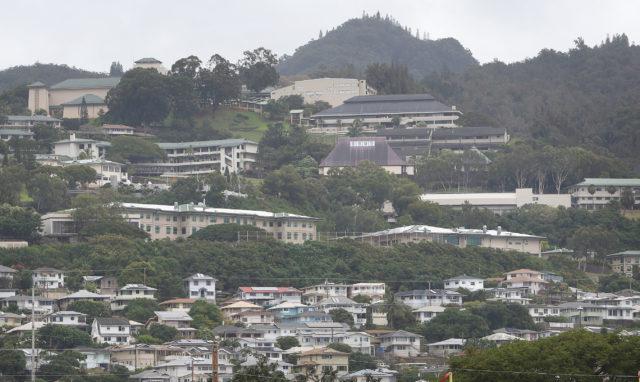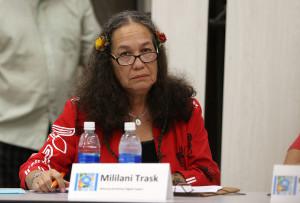|
Kamehameha Schools Faces a Spate of Sex Abuse Claims
By Yoohyun Jung
At least 16 plaintiffs are named in six lawsuits. Other schools also have been sued in the weeks leading up to a deadline Friday. Kamehameha Schools, endowed by the state’s largest private landowner to educate children of Hawaiian descent, faces a new wave of sex abuse claims from former students coming forward just before the statutory deadline to file such lawsuits. At least six lawsuits involving 16 plaintiffs filed in recent weeks include new claims against Dr. Robert Browne, the disgraced psychiatrist whose abuse of students already led the school to pay $80 million in a settlement, as well as newly accused teachers, an administrator and dorm advisors from the 1970s and ‘80s. The teachers and staff are accused of abusing their positions of power to sexually molest and assault students, in some cases giving them alcohol or illicit drugs to facilitate their abuse. The plaintiffs say the school turned a blind eye. In 2012, the Legislature approved a statute allowing victims to file civil claims against their abusers long after the statute of limitations had passed. The time limit had been extended every two years until this year, when another extension was going to be considered. Then the COVID-19 pandemic put the Legislature into an abrupt recess. Now, with the window closing Friday and no extension in the works, attorneys have been flocking to the courts to file new claims against Kamehameha Schools and other institutions, including the Roman Catholic Church and a few other schools. One factor setting apart the Kamehameha Schools cases is that many students boarded there. The other schools were mostly day institutions, said Mililani Trask, an attorney representing one of the alleged victims who has filed suit in recent weeks. “I feel that the negligence that we see here was compounded and facilitated,” she said. “Kids had nowhere else to go.” Many of the plaintiffs in the new round of cases against Kamehameha Schools were dorm residents from neighboring islands, in the school’s care and supervision day and night, according to court documents and plaintiffs’ attorneys. “Kamehameha Schools was supposed to function and care as a parent would,” said Patricia Talbert, Trask’s co-counsel. Officials with Kamehameha Schools declined an interview, but issued a statement. “We are saddened by the tragic events described by our former Kamehameha students,” school spokesman Darren Pai wrote. “We honor and appreciate the strength and courage it took for them to come forward. They are part of our ʻohana. We care for all of them and will continue to work with them to do what is pono.” The new cases detail how teachers and dorm advisors allegedly enticed mostly male and some female students into their homes by offering special privileges or favors. At least two lawsuits allege that perpetrators gave students drugs and alcohol before raping them. Civil Beat does not name alleged victims of sexual abuse such as the plaintiffs in these cases. In some cases, other adults at the school allegedly knew about the wrongdoing and did nothing. One lawsuit involving a 1972 incident says a female student told her counselor she’d had sex with her teacher, but the counselor did not report it to police as required by law. Another case involves a 1984 graduate — Trask and Talbert’s client — who is accusing four different men, two of whom were Kamehameha teachers. One, whom he accuses of sexually abusing him during a field trip to Samoa, eventually became an administrator. One defendant in that case who was not a teacher, the plaintiff alleges, had unrestricted access to his dorm despite not being affiliated with the school. That man drove him in and out without anyone questioning them and exposed him to alcohol, drugs and orgies, the plaintiff alleges. “Kamehameha Schools did not have any security,” Talbert said. “If there was any security, it was not effective. It allowed pedophiles.” The man, now in his 50s, spent much of his adulthood engaging in self-destructive behavior as a result of these incidents, addicted to drugs and unable to maintain intimacy with loved ones, according to the lawsuit. His attorneys say they have tried to settle with the school but could not come to an agreement. Each of the alleged victims is seeking an unspecified amount in damages. Kamehameha Schools is a private charitable trust, endowed by the Bernice Pauahi Bishop Estate, which is worth about $12 billion. These lawsuits could leave the school wide open to liabilities, said Nicholas Mirkay, a University of Hawaii law professor. “As a charitable trust, there’s no liability protection,” he said. State laws don’t generally provide protection for charitable trusts. But most organizations like Kamehameha have insurance to cover those liabilities. In a previous settlement — considered Hawaii’s largest ever — Kamehameha Schools paid out $80 million to more than 30 plaintiffs who accused the school’s psychiatrist of sexual improprieties. Browne, who committed suicide in 1991 after a victim confronted him, was believed to have sexually molested and assaulted at least 34 boys during therapy sessions from the late 1950s to mid-1980s at the St. Francis Medical Center, where Kamehameha students were sent for counseling. Newly surfaced accusations say that the school transported students to Browne for therapy and behavioral adjustment, during which he would convince students that the sexual abuse he would perform on them was part of treatment. He was also allegedly approved as a “dorm sponsor” and given privileges to access students overnight and on weekends. Aside from the lawsuits against the school, attorneys have also filed medical malpractice claims against St. Francis Medical Center, where Browne was employed. As part of the 2018 settlement agreement, which came after a three-year legal battle, Kamehameha Schools had to set up a hotline for students to report potential abuse and a fund to help other victims who came forward. “It’s just so important that school systems handle these cases with the intent of protecting children at all costs,” said Terri Miller, president of the board of directors at Stop Educator Sexual Abuse Misconduct & Exploitation, a national advocacy organization. “Because when they don’t, they’re protecting predators.” Child sex abuse is very much a preventable crime, she said. Adults working with children should “self-assess when they are crossing boundaries” and get help before they engage in risky behavior, she said. “Training is a multi-faceted prevention practice,” she said. State laws should not limit when a victim can file a claim, Miller said. Many sex abuse victims only come forward in their 40s and 50s after having already suffered a lifetime of emotional trauma and built up the courage, she said. “It should just be the law that anyone who violates a child should be held accountable no matter how much time has passed,” she said. Hawaii Rep. Cynthia Thielen shares that sentiment. That’s why she sponsored a bill that would have increased the statute of limitation to seek a civil claim for sexual abuse to 50 years after the victim’s 18th birthday. “When we see the length of time it takes for some of these victims to be able to actually deal with their injury and then take public action, we realized that the shorter window of time was just arbitrary and didn’t really provide relief to those people,” Thielen said. However, with the Legislature in recess because of the pandemic, she said it’s uncertain when the matter could be taken up again. The priority when lawmakers return to session will be restoring the economy, especially helping local businesses. That doesn’t mean the issue of providing redress to sexual abuse victims is no longer important, she said. “There clearly are victims out there,” she said. “Those victims deserve their time in court and their relief.” Contact: yjung@civilbeat.org
|
.
Any original material on these pages is copyright © BishopAccountability.org 2004. Reproduce freely with attribution.


